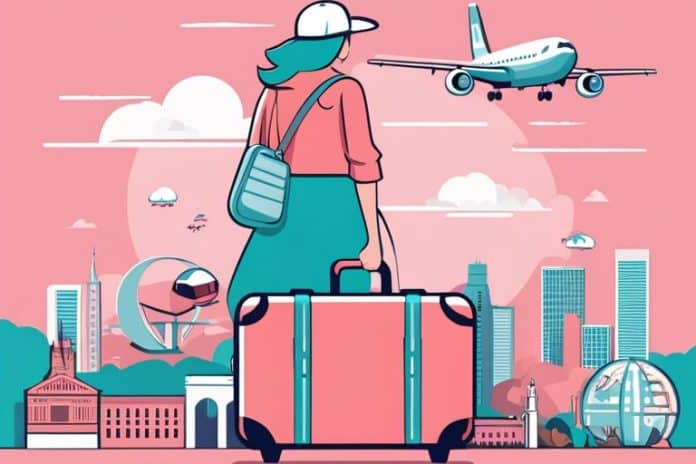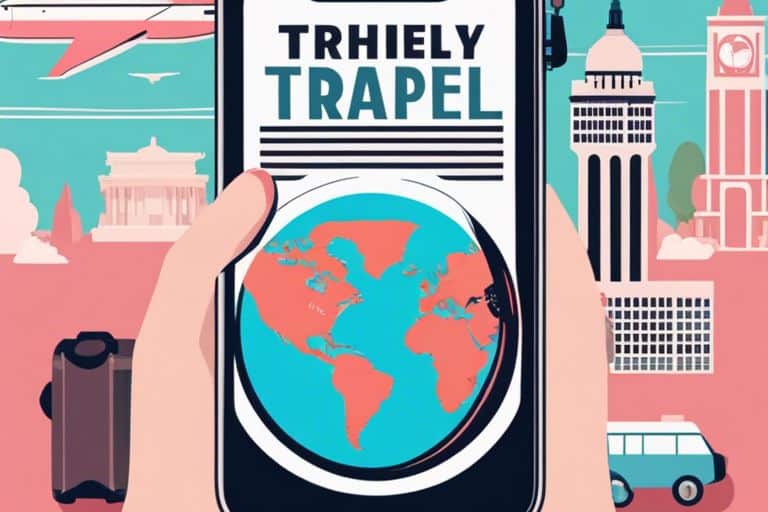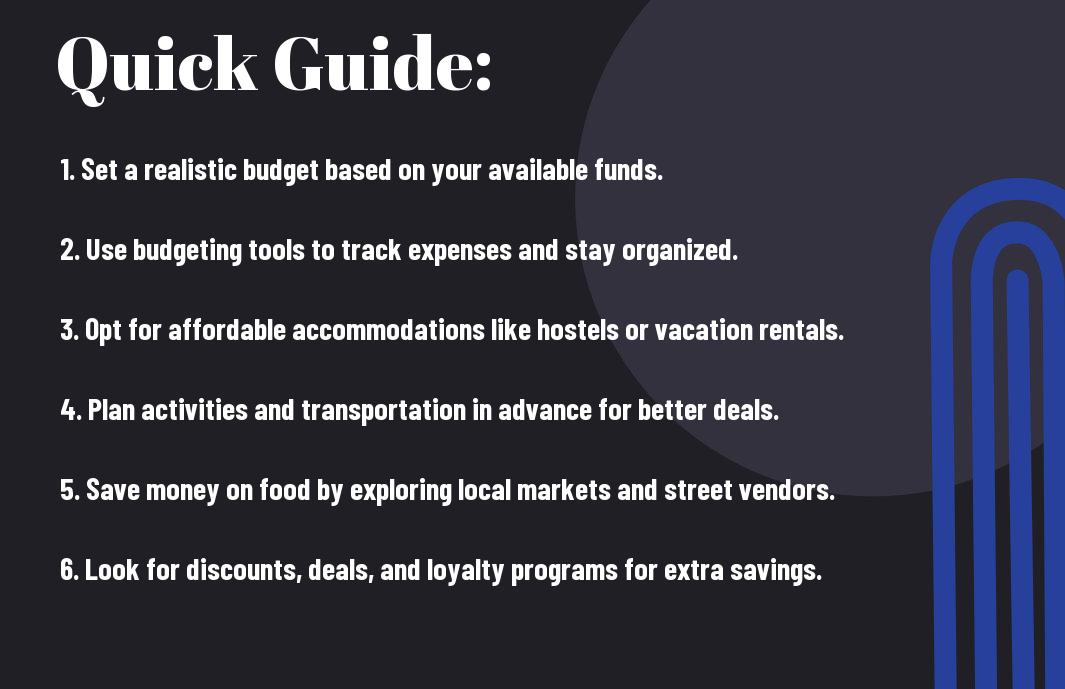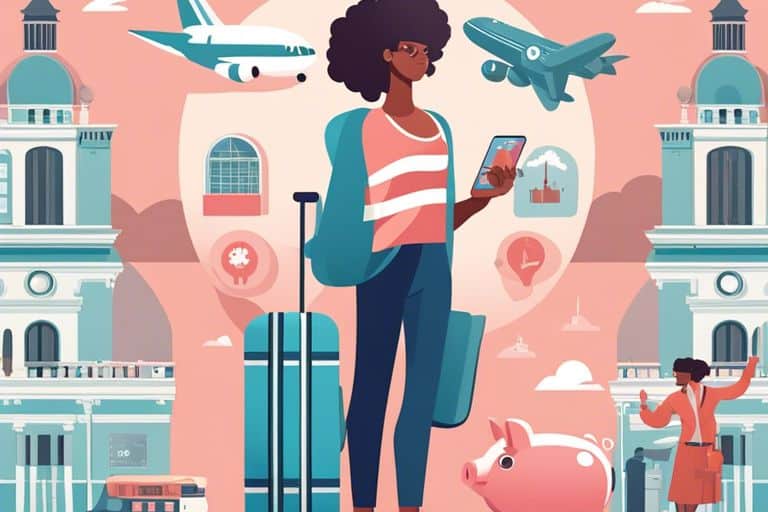Overwhelmed by the countless options and hidden costs that come with planning a trip? Look no further. In this comprehensive guide, we will equip you with strategies and tips to maximize your travel budget and make the most out of every penny spent. From booking cheap flights to finding budget-friendly accommodations, we will cover every aspect of your journey. Stay tuned to discover insider secrets and practical advice that will empower you to explore the world without breaking the bank. Say goodbye to financial stress and hello to unforgettable adventures!
Key Takeaways:
- Plan in Advance: Planning your travels ahead of time can help you find the best deals on flights, accommodation, and activities.
- Use Travel Rewards: Take advantage of credit card points, airline miles, and hotel loyalty programs to save money on your trips.
- Travel Off-Peak: Avoid peak travel times to get lower prices on flights and accommodations.
- Opt for Budget Accommodation: Consider staying in hostels, Airbnbs, or budget hotels to save money on lodging.
- Eat like a Local: Save on food expenses by trying local street food or cooking your meals instead of dining at tourist spots.
- Use Public Transportation: Public transportation is often cheaper than taxis or rental cars and can help you save money while getting around.
- Be Flexible: Stay flexible with your travel dates and destinations to take advantage of last-minute deals and discounts.
Types of Travel Budgets
You can approach budgeting for your travels in various ways, depending on your priorities and preferences. Understanding the different types of travel budgets can help you make informed decisions that align with your financial goals and travel aspirations. Below is a breakdown of the common travel budget categories:
| Bootstrapping Backpacker | Luxury Explorer |
|---|---|
| Family Vacationer | Digital Nomad |
Bootstrapping Backpacker: Traveling on a Shoestring
Types of budget travelers who are keen on experiencing the world with limited resources can opt for a bootstrapping backpacker approach. This style of travel involves minimalist living, hostel stays, and budget-friendly meals.
Luxury Explorer: Indulgence Without Wastefulness
If you have a taste for luxury but are mindful of not being wasteful, the luxury explorer budget category might be ideal for you. This type of traveler appreciates ample comfort and fine dining without indulging in unnecessary extravagance.
The Luxury Explorer budget category balances high-end experiences with responsible spending, ensuring that every penny is well-utilized to maximize the overall travel experience.
Family Vacationer: Managing a Budget for Multiple People
Little ones in tow can significantly impact your travel budget, making meticulous planning important for family vacationers. From accommodation choices to activity selection, managing expenses for multiple people requires careful consideration to keep costs in check.
Managing a budget for a family vacation involves balancing the needs and preferences of each family member while staying within the overall financial constraints to ensure a memorable and stress-free trip for everyone.
Digital Nomad: Long-Term Travel Considerations
To leverage the benefits of location independence while maintaining financial stability, digital nomads must consider unique long-term travel considerations. Planning for remote work opportunities, accommodation arrangements, and financial projections are crucial for sustaining a successful nomadic lifestyle.
Shoestring budgets and prolonged travel periods can pose challenges, but digital nomads can navigate these hurdles with strategic planning and a proactive approach to ensure a sustainable and fulfilling travel experience.
Steps to Building Your Travel Budget
Assessing Your Financial Situation
To ensure a successful travel budget, it is necessary to first assess your current financial situation. Take stock of your income, savings, expenses, and any outstanding debts. Understanding your financial standing will help you set realistic budget goals for your trip.
Estimating Costs: Transportation, Accommodation, Food, and Activities
For a comprehensive budget, you need to consider the costs of transportation, accommodation, food, and activities. Research the average prices in your destination to get a rough estimate. Don’t forget to include any additional expenses like visa fees, travel insurance, and souvenirs.
Your travel budget should take into account the cost of transportation, accommodation, food, and activities. Transportation costs may vary depending on the mode of travel, while accommodation expenses can range from budget hostels to luxury resorts. Food costs will depend on where and what you eat, and activities can range from free sightseeing to paid excursions. Plan accordingly to allocate funds for each category.
Allocating Funds for Unexpected Expenses
If unforeseen circumstances arise during your travels, having emergency funds set aside can be a lifesaver. Allocate a portion of your budget for unexpected expenses such as medical emergencies, lost luggage, or last-minute itinerary changes. It’s always better to be prepared than to be caught off guard.
Accommodation and transportation are often the most significant expenses while traveling. By setting aside a buffer in your budget for unexpected costs, you can ensure that you have a safety net in case of emergencies. Consider purchasing travel insurance to provide additional coverage and peace of mind during your trip.
Monitoring Your Spending and Adapting on the Go
Even the most meticulously planned budget can encounter unexpected challenges. Monitor your spending throughout your trip and be prepared to adapt as needed. Use budget tracking apps or spreadsheets to keep tabs on your expenses and adjust your budget accordingly. Being flexible and resourceful will help you stay on track financially.
Budgeting is an ongoing process that requires constant monitoring and adjustments. Be prepared to make changes in your spending habits based on your actual expenses while traveling. Look for areas where you can cut costs or reallocate funds to ensure that you stay within your budget constraints. Note, the key to a successful travel budget is flexibility and adaptability.
Tips for Stretching Your Travel Dollar
After carefully planning your dream vacation, it’s crucial to make the most of every dollar you spend. Here are some tips to help you stretch your travel budget:
Timing and Seasonality: When to Book and Travel
Your travel expenses can vary significantly depending on when you book your flights and accommodations. Booking in advance, traveling during shoulder seasons, or opting for mid-week flights can help you save big on your next trip.
Transportation Hacks: From Flights to Local Transit
An important aspect of saving money on travel is optimizing your transportation costs. Whether it’s finding discounted airfare through promo codes or taking advantage of public transportation in your destination, there are plenty of ways to cut down on this expense.
Accommodation Secrets: Alternatives to Traditional Hotels
Some cost-effective alternatives to traditional hotels include options like vacation rentals, hostels, or even house sitting. These accommodation choices not only help you save money but also offer unique experiences that enhance your travels.
Eating Like a Local: Saving on Food Without Sacrificing Experience
For budget-conscious travelers, eating like a local can be a game-changer. Look for local markets, street food vendors, and neighborhood cafes to savor authentic cuisine without breaking the bank. Plus, exploring the local food scene can add a cultural dimension to your trip.
Factors Influencing Your Travel Budget
To effectively maximize your travel budget, you must consider various factors that can significantly impact your expenses. Understanding these key influencers will help you plan a cost-effective trip without compromising on the experience.
- Destination Considerations: Cost-of-Living Variations
- Currency Exchange Rates and Their Impact
- Cultural Practices: Tipping and Bargaining
- Travel Insurance: Is It Worth the Cost?
Destination Considerations: Cost-of-Living Variations
Influencing your travel budget, the cost of living at your destination plays a crucial role in determining how far your money will stretch. Higher cost-of-living destinations may require a more substantial budget to cover expenses such as accommodation, meals, and transportation.
Currency Exchange Rates and Their Impact
There’s a direct correlation between currency exchange rates and your travel budget. Fluctuations in exchange rates can either increase or decrease your purchasing power in a foreign country. It’s necessary to monitor exchange rates and plan your budget accordingly to avoid unexpected costs.
Understanding these fluctuations can help you make informed decisions about when to exchange your currency and how much to budget for expenses. Keep an eye on the exchange rates leading up to your trip to optimize your spending power while abroad.
Cultural Practices: Tipping and Bargaining
Budget-conscious travelers must be aware of cultural practices related to tipping and bargaining in their destination. Tipping customs vary worldwide, and not understanding local expectations can lead to overspending. Similarly, knowing how to negotiate prices in markets can help you secure better deals and stay within your budget.
Travel Insurance: Is It Worth the Cost?
For peace of mind during your travels, travel insurance is a crucial consideration. While it adds to your upfront costs, the protection it provides against unforeseen circumstances such as medical emergencies, trip cancellations, or lost luggage can ultimately save you money in the long run. Evaluate your travel plans and the associated risks to determine if the cost of travel insurance is worth the investment.
The Pros and Cons of Budget Travel Strategies
All travelers aim to make the most of their budget when planning their adventures. To help you decide on the best approach for your next trip, let’s break down the pros and cons of various budget travel strategies:
| Pros | Cons |
|---|---|
| Cost-effective | May lack flexibility |
| Opportunity to save money | Possible compromise on comfort |
| Allows for longer travels | Requires extensive planning |
| May lead to unique experiences | Potential hidden costs |
| Encourages resourcefulness | Travel disruptions can be challenging to manage |
Early Planning Versus Last-Minute Deals
Planning your trip well in advance allows you to secure the best deals on flights and accommodations. On the other hand, last-minute deals can sometimes offer significant discounts, especially for spontaneous travelers. However, waiting until the last minute can also result in limited choices and higher prices due to availability constraints.
Group Tours Versus Independent Travel
Independent travel allows for more flexibility in your itinerary and the freedom to explore at your own pace. On the other hand, group tours often provide convenience, local expertise, and built-in social opportunities. Consider your travel style and preferences to choose the most suitable option for your trip.
Independent travelers enjoy the freedom to design their itineraries, interact with locals, and immerse themselves in the culture. However, it requires more research, planning, and may feel daunting for first-time travelers.
Loyalty Programs: Benefits and Limitations
Deals with loyalty programs can provide significant savings, upgrades, and exclusive offers for frequent travelers. However, limitations such as blackout dates, limited availability, and point devaluation can hinder your ability to redeem rewards effectively. Make sure to understand the terms and conditions before committing to a loyalty program.
To maximize the benefits of loyalty programs, focus on accumulating points through affiliated partners, utilizing promotional offers, and staying informed about program updates and changes. Keep track of your points and plan your redemptions strategically to make the most of your loyalty rewards.
Credit Cards and Travel Points: Leveraging Your Spending
Travel credit cards are a valuable tool for earning travel points, cashback rewards, and travel benefits such as airline lounge access and travel insurance. By leveraging your everyday spending on credit cards, you can accumulate points efficiently and unlock valuable perks for your travels.
Points earned through credit card spending can be redeemed for flights, hotel stays, car rentals, and other travel expenses, helping you offset costs and enhance your travel experiences. However, make sure to manage your credit card responsibly, pay off balances in full, and avoid accruing high-interest charges to fully benefit from travel rewards.
Conclusion
With this in mind, mastering the art of maximizing your travel budget is crucial for experiencing more without breaking the bank. By following the ultimate guide provided, including planning ahead, being flexible, and taking advantage of deals and discounts, you can stretch your travel funds further and make the most of your adventures. Keep in mind, with the right strategies and mindset, you can indulge in new experiences, see more destinations, and create lifelong memories, all while staying within your financial limits.
FAQ
Q: Why is it important to maximize my travel budget?
A: Maximizing your travel budget allows you to make the most of your travel experience without overspending. By being strategic with your spending, you can enjoy more activities, stay in better accommodations, and indulge in local cuisine without breaking the bank.
Q: How can I save money on transportation during my travels?
A: To save money on transportation, consider booking flights in advance, using budget airlines, taking advantage of public transportation, walking or cycling when possible, and opting for shared rides or carpooling services. Additionally, look for discounted passes or travel cards for trains, buses, or subways in your destination.
Q: What are some tips for cutting costs on accommodations while traveling?
A: To cut costs on accommodations, consider staying in budget-friendly options like hostels, guesthouses, or Airbnb rentals. Look for deals and discounts, book directly with the property for potential savings, consider alternative lodging options like house sitting or couchsurfing, and be flexible with your travel dates to take advantage of lower rates during off-peak seasons.




